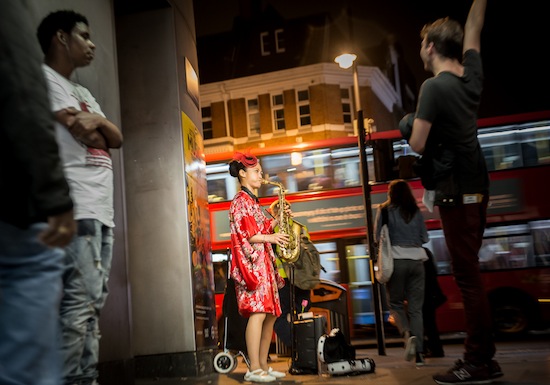All photographs courtesy of Valerio Berdini
Fat White Family began in south London, most famously the Queen’s Head on Stockwell Road, where they lived and practised and played their early gigs. Now they’re one of the greatest bands in the UK, headlining 300 yards down the road at the Brixton Academy. So why does it matter, exactly, that they can’t afford to live in Brixton anymore?
Lias walks on stage tonight with his hair slicked back, in his spivvy suit with a silky shirt, looking like a man who could have got you a pair of silk stockings in 1943. He is raging, though, and so is the whole band, through opener ‘Tinfoil Deathstar’ – Saul is ablaze, grinning, three backing singers give it extra whoosh, the sax player in his red beret adds to the surging fury. It’s quite a thing to have a huge crowd all holding one finger up in the air, singing “Type 1, type 1” in reference to a man killed by government austerity cutbacks – the song is, in part, about David Clapson, an unemployed ex-soldier with type 1 diabetes who died in 2013 after his benefits were cut. (The last time I heard such explicit reference to the welfare state in such a great song was the “DHSS” chant in Wham Rap. Pleasingly, FWF recently paraphrased that song when they said, “We don’t want a job for five pounds fuck all an hour.”)
By the next song, ‘Is It Raining In Your Mouth?’, Lias is topless, swigging from his bottle of wine, and doing some kind of funky chicken, and now the audience are holding up their “five sweaty fingers on the dashboard”. The crowd is adoring and crowdsurfing at the front and yelling along pint-in-hand at the back.
Lias casts a Nosferatu shadow on the Brixton Academy walls during ‘I Am Mark E Smith’. He lounges on the speakers, on the drum riser, on the floor. He raises his hands and the crowd whoops, he raises them higher and the crowd obeys, gets louder. He harangues, demented, during ‘Garden Of The Numb’. He rails and screeches during ‘Breaking Into Aldi’, then crouches like a bouncing yogi on the floor during ‘Satisfied’ while the crowd sings. They have so many good songs. ‘Hits Hits Hits’ is less sinister live, but just as louche and syrupy and horribly sexy. ‘Touch The Leather’ is so catchy and revolting. During ‘Auto Neutron’, the crowd yells along to the chorus, a gang shouting some obscure allegiance (what does “we are auto neutron” mean?). This kind of singalong would be vapid cosiness at an Elbow gig; here it somehow manages to be warmly sinister, and brilliant.
‘Bomb Disneyland’ is one FWF song that I don’t much love, but it is funny. “All your kids are naked, all your kids are naked in my mind,” it goes, gleeful, taunting. Why is it so funny? Because it would wind up all the right people, maybe, because Gary Glitter would never sing it. Because like quite a few Fat White Family songs, it is asinine and absurd – like King Missile, like The Stooges, like The Monks, like Devo. They have that way of being genius-stupid, of being infantile as protest at the way ‘grown-up’ authorities are taking our cities, is a way to be angry and to stay engaged without killing yourself; it’s a way to be angry and enjoy yourself.
For the encore they are joined on stage by The Black Lips, mooching, singing, dancing, meandering. A glam tumbling roar begins. This gig is the band’s last in the UK for a while – they’re in the US next, then they’re making a new album – and tonight they’ve played their newest and their oldest and now a screeching, yowling, stomping cover of The Monks’ ‘I Hate You’. It’s magnificent, and then they’re gone.

“Brixton is dead, that much is clear,” Fat White Family declared a few weeks ago. “The bastards have won, there is no longer any hope for our kind, the life and soul of the place is being shipped down the river at an ever increasing pace, homogenisation is the key word, go and fuck yourself with your sense of ‘community’, in a world that glorifies only personal success and the acquisition of power it means less than nothing.”
In the past, they’ve helped to run a Yuppies Out campaign in Brixton, and handed out Dairylea slices and White Ace in protest at the opening of Champagne & Fromage in newly branded Brixton Village (it used to be Granville Arcade). Lias recently told The Quietus, “Half of the venues in Brixton are closed, the Queen’s Head is gone, there’s no chance of you renting a flat round here, not on your wages. It’s despicable… I’ve been in London for 12 years and I’d like to be able to make London my home but I just can’t see how that’s going to be possible, ever. I’m never going to be able to live in my self-adopted home. And fuck that, what a load of shit. It’s disgusting. And I don’t even have it that bad.”
Facts and figures vary – and the data is not up to date – but there’s no doubt that Brixton is getting gentrified. In Brixton Village there’s a "grill bar" called Bukowski, where a burger is £10, or more if you want pulled pork on it too. There’s a “hip hop chip shop” called BXTN with a terrible fake-graffiti portrait of Tupac on the outside of it. There’s Brixton Box, or ‘the hipster playpen’ as my friend calls it, with industrial crates and oil drums painted in primary colours, with more fake graffiti, arranged in a big square to create a fenced-off zone of bars, cafes and prescribed fun. It all makes me think of the bit in The Fisher King where a madman goes into a yuppie bar to shoot everyone. I am not going to shoot anyone, but I sympathise more with that madman every week.
But what is actually wrong with a few microbreweries and some fake graffiti? Well, it’s cynical and patronising, for a start, to paste Charles Bukowski’s poetry on your toilet walls, to put Tupac on the front of your chip shop, in order to sell more of your overpriced and completely unrelated stuff. None of us has failed to notice businesses co-opting culture to sell their own shitty wares for the last few decades, but just because it’s not new that doesn’t make it less annoying. It’s even more depressing that so many of us are sucked in.
More importantly, though, London is slowly falling prey to what Norwegian academic Jonny Aspen has named zombie urbanism: an increasingly homogenous idea of what’s important in a city – the fixation on cultural institutions, visually commanding new architecture, smoothly designed public spaces. There’s nothing bad about those things in themselves, but prioritising them means looking at a city from the outside in, rather than looking at the reality of a city, allowing it to grow, shift, thrive by means of its everchanging, developing and diverse population. It is a kind of staged urbanism, says Aspen, where “there is no room for irregularity and the unexpected. It is well designed, neat, and tedious… Everything looks clean, tidy, and civilised. The promenade is equipped with well-designed chairs and benches. So everything seems in order, everything seems to make for a lively urban area. But even though the scenery is outstanding… the whole area feels dull and boring … The same ingredients are replicated all over: widened sidewalks, new seating, more plantings, upgraded lighting and so on, plus an attraction or two, may be an artwork or something, that apparently is to make the area stand out as something unique and special.” But, he points out, “City life is about encountering the unexpected and the unfamiliar.”
I live not far from the new, privately owned development at King’s Cross. We have fountains that don’t cool you down because there’s no shade. Food that doesn’t feed you because you can’t afford to buy it. Housing that doesn’t provide homes because it was created as an investment opportunity. There’s an amphitheatre with astroturf where you can eat your lunch and lounge about, and it all feels like a place designed to look clean and elegant on the architects’ model, rather than for people to actually live in. It’s like having sex guided by the most generic/ tedious/ aspirational porn you’ve ever seen, rather than guided by how it feels, by whoever else is there, seeing what develops, allowing for the unexpected and the spontaneous. Brixton Village is privately owned too – there are more and more privately owned public spaces (POPS, to use their inappropriately cheery acronym) in London, from Westfield to Canary Wharf. As activist Naomi Colvin puts it, "It is a vision of society in which you work and you shop. At times when you are not working or shopping, you may go to restaurants."
Sociologist Richard Sennett describes these areas as “dead public spaces” where “the environment prompts people to think of the public domain as meaningless”. This is the same kind of doctrine that Thatcher revealed when she said, “There is no such thing as society.” These are spaces where huge high-density buildings provide efficient investments but where the people and the behaviours at street level are completely preordained, if there’s anything happening there at all. You can have a nice time in Granary Square, but you will meet a lot of middle-class office workers and you’ll notice a distinct lack of anyone who looks like they earn less than £40k. There’s a beautiful new swimming pond nearby, but during a hot spell you’ll find it’s been fully booked online for the whole week. That’s not spontaneity and it’s certainly not inclusive – there are many among us who don’t log in, sign up and buy tickets in advance, for lots of reasons, although you can bet that those middle-class office workers do.
As US cultural geographer Don Mitchell puts it, “Only in public spaces can the homeless, for example, represent themselves as a legitimate part of ‘the public’. Insofar as homeless people or other marginalised groups remain invisible to society, they fail to be counted as legitimate members of the polity. Public spaces are absolutely essential to the functioning of democratic politics.” Without visibility, we are ignored and destroyed. Neil Smith, a cohort of Mitchell, describes how during the 50s and 60s, the white middle classes moved to the suburbs and chunks of the city were abandoned. And then, “gentrification became a systematic attempt to remake the central city, to take it back from the working class, from minorities, from homeless people, from immigrants who, in the minds of those who had decamped to the suburbs, had stolen the city from its rightful white middle-class owners.” The new housing, restaurants and artistic venues are not aimed at those who lived in the area a decade or two ago, or those who still live there, 100 yards away on Cally Road or Coldharbour Lane. It is revanchism, with those of us who are used to having what we want, those of us who are used to feeling entitled to whatever we want, abandoning an area and then getting annoyed and wanting it back when it starts to look cool and appealing.
There are alternatives, of course, and London is not dead yet. Even Fat White Family would agree with that, I bet, on an optimistic day. Writer Luc Sante describes his ideal city as “the sort of city where a burglar, a banker, a taxi-driver, an academician, a modiste, and a pushcart vendor might all fetch up together in a corner banquette at the end of the night.” Doesn’t that sound good? Diversity, chance, other people, fun.
US journalist Jane Jacobs, more than 50 years ago, had it right: “There is a quality even meaner than outright ugliness or disorder, and this meaner quality is the dishonest mask of pretended order, achieved by ignoring or suppressing the real order that is struggling to exist and to be served.” She described how in city planning and development, even before the landgrabs we’re currently witnessing, “years of learning and a plethora of subtle and complicated dogma have arisen on a foundation of nonsense,” with planners who ignore “the hard, complex business of assembling, using and testing, bit by bit, true descriptions of reality drawn not from [how they think] it ought to be, but from how it is… they have not yet embarked upon the adventure of probing the real world.”
In recent decades, is there any aspect of a great city that is down to planners and developers, really? The food, the music, the nightlife, the streetlife, the people, the language, the traditions old and new, the cultures and the ideas. The best that planners can do is to ALLOW this all to happen – and that’s a wonderful thing when they do it. But what they usually do is stop the good stuff. They sell it, first – they use the ‘vibrant’ local culture to increase prices of land and property – and then they destroy existing and future joy because they can’t see a straight line from where they are to how they would sell that future joy.

Fat White Family are, among many other things, an antidote to the patronising new bars and the co-opting of culture for profit. Why? A band who make an album like Songs For Our Mothers is not a band who patronise their listeners. They’re singing about Goebbels and Hitler in the bunker, they’re singing about Tina Turner surviving abuse from Ike, they’re singing about the weirdness of sex; they trust you to trust them, to listen and think and enjoy (and they have the confidence, usually, not to care if you don’t). And while I’ve no doubt they’d like a bit more money, a band who make an album like Songs For Our Mothers – a band who release early songs as brilliantly unsettling as ‘Cream Of The Young’, ‘Wet Hot Beef’ and ‘Touch The Leather’ – is not a band too interested in profit. They are interested in sex, subversion, honesty, raw meat and brilliant videos, but not profit.
There are dozens of practical and excellent organisations across London working to keep the city alive. Traders in Brixton Arches are fighting Network Rail’s evictions, lease terminations and rent increases of 300% (and you can help). There’s an extraordinary group of people hoping to take over the redevelopment of St Ann’s Hospital up in Haringey. As Jane Jacobs wrote, “Lively, diverse, intense cities contain the seeds of their own regeneration, with energy enough to carry over for problems and needs outside themselves.” And London still is a lively, diverse, intense city.
I remain convinced that having fun is the vital partner to being useful. There are many ways in which pleasure is political; for one thing, if you’ve ever had a truly good time you want to make sure that everyone can have a good time, that they’re not crippled by poverty, fear, shame, anxiety – it’s like Maslow’s Hierarchy Of Needs but with ‘fun and pleasure’ right next to ‘self-actualisation’ at the top. You want your friends on stage with you when you play Brixton Academy; you want people to know about David Clapson; you want to treat everyone with a level of respect and you want to embrace taboo and reality and an unsanitised, unpredictable life. You want people to have homes, food, safety, dignity, not just because we all should, but because then we can all get on with the good stuff, with the fun, the love, the contentment and joy, the dancing, the spontaneous, unpredictable, trusting in the goodness of the party people pleasure of it all.

Busker outside Brixton tube station



